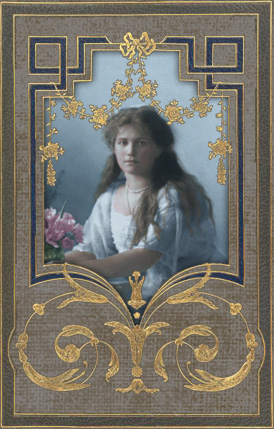Learn more about enthusiastic ongoing technical and marketing support from Pallasart Web Design







CHAPTER 25
SOCIAL LIFE IN RUSSIA
SOCIAL life is much simpler than in England. At theatres and dinners in public places, hotels, restaurants, and so forth, afternoon dress is considered de rigueur. No one would think of putting on a decolletee gown. It would be considered very bad form. At theatres, however, both in the morning and evening, hats are removed as an act of courtesy to those seated behind. At all small parties, whether dinner, dancing, or music, or small games, a light silk, muslin or canvas dress, made high, is worn.
But at all big functions full dress is worn. At a Court luncheon a low-necked dress and a large picture hat is the costume. Men, however, unless in uniform, wear evening dress oftener than with us. A music master will give his lessons in the regulation evening suit. It looks very funny.
On the first of January all men drive round to their acquaintances in full evening dress, congratulate the ladies, and are supposed to drink to their health. For this they put on evening dress. They start about nine o'clock in the morning, so it looks rather peculiar. Poor fellows! they come home in the evening generally worn out, very hungry, and with a raging headache, born of all the sips of vodki taken during the day.
Nine o'clock in the evening is a favourite time for paying visits. At this hour the Russians drink tea; the tray is brought in and glasses of tea are dispensed without cream or milk, but very sweet, and with slices of lemon floating in each glass, or, if preferred, a spoonful of jam is stirred into the glass. They looked upon me as a heathen, because I don't take sugar in tea.
A sister of mine was visiting on a farmhouse in the north of Ireland once, and said to the hostess, "Please, no sugar for me." She looked surprised, but answered encouragingly, "Oh, Mrs. H., we have plenty of sugar in the house." Well, that did not happen to me in Russia, but much surprise was expressed at my want of taste. Russians will sometimes hold a lump of sugar in their fingers and nibble a bit of it before taking a mouthful of tea. They say it tastes better so.
The tea-table is always well furnished with cakes of various kinds, some of them particularly nasty. I used to think they were flavoured with hair-oil. Caraway and poppy seeds are all largely used in confectionery; fruit and bonbons are also served with tea.
The tea equipage is generally very dainty; the glasses are put into silver stands with handles to enable them to be lifted with ease; pretty gilt or enamelled silver is used, and the napery is of the finest, most dainty description, for Russians love fine linen. Every Russian has his or her own store of linen, just as he has his own underclothing, and I have heard much wonder expressed at the bare idea of sleeping on the sheets and pillow covers of other people. Even a servant brings her own house-linen with her.
When a layette is prepared sheets and towels, etc., are always included, and kept separate for each child's use, and it is counted very careless to put the sheets of one child in the bed of another. In going on a visit anywhere, you take your own sheets, etc., with you, and send them to the wash with your own linen. English people, however, are excused from this, on account of their incomprehensible habit of using family linen. But if a Russian governess or visitor's linen is not up to the mark, she receives very scornful looks from the servants.
In the trains, for a night journey one can either bring sheets, blankets and a pillow, or hire from the conductor for one rouble -- about two shillings. But soap or towels are never provided.
The following story is told of an Englishman travelling for the first time in Russia. He met a Russian who spoke all languages, and confided to him that he had brought no towel, and was tired of wiping his face on his sheet or pocket-handkerchief, and he could not succeed in making the conductor understand what he wanted. The Russian told him he had only to say" Politiensa," and his wants would be supplied. The Englishman learned the word, and presently called for the conductor, and, as he thought, asked for a towel.
The conductor gesticulated and bowed, but brought no towel, so the Englishman gave it up. Later on he met his Russian friend, and told him that though he had said what he had been told he had got no towel. "Stupid man!" said he; "can't even understand his own language." The Russian caned the conductor and spoke to him. He turned to the Englishman and asked him what he had said. The latter replied, "Palatinski, of course." Judge of his surprise when he heard that he had actually asked the poor conductor if he spoke Latin. The latter had replied that he only spoke Russian and German, and excused himself for not knowing Latin by saying it was so seldom called for.
Duelling is still a recognised institution in the land of the Tsar. One of the officers about the Court is said to have fought three, and killed his man each time. I always felt a horror of the man, but I believe, notwithstanding his bloody record, he was quite harmless and even good-natured.
On one occasion a young officer of a Cossack regiment took two girls from a cafe chantant to spend a day in the country. In the evening all three, being heated with wine, made their way to the station; the women entered the train and the prince stood on the platform talking to a friend. The women had seated themselves opposite a gentleman who had a terrible scar on his face, the result of a sword-cut which had laid open his visage from temple to chin.
The two women began to make impertinent and offensive remarks about the man and his appearance. They were French and spoke in their own language. He at last replied to them in French: "Ladies, when first you got into the train I thought you were French ladies; I now see I was mistaken. French ladies are too delicate in sentiment, and too polite to mock at a scar won in honourable warfare. I now perceive that you are nothing but a pair of peasants." He got up and went to another part of the train, leaving the women speechless under his well-merited rebuke.
When the prince got into the train the women told him that they had been insulted, described the appearance of the gentleman, and urged him to challenge him for a duel. The prince accordingly sought him out and gave him his card, saying, "You have insulted mes dames and must fight a duel."
Now the other was a retired military man, who had fought for the Boers against England. He had also been through the Turkish war, and had seventeen wounds on his body. After the war in South Africa was over he had returned to Russia and taken up journalism as a profession. He had no wish to fight a duel, and replied to the effect that he had seen rivers of blood flow, had the scars of seventeen wounds on his body, and no one, therefore, could call his courage into question. He would not fight, specially for two such women as those. He was a journalist, and only desired peace.
The prince returned to his companions. When the train arrived in St. Petersburg the journalist was the last person to alight, but his enemies were waiting outside the station for him. As he approached, one woman pushed her companion against him violently. He caught her by the arms and steadied her or she would have fallen, and he then tried to pass on. But the prince blocked his way. Forcing his card on him he demanded his address and satisfaction. In the course of the evening two friends of the prince called upon the journalist. The latter again refused to fight, but said that the officer owed him an apology. This, of course, was refused. Now an officer cannot fight a duel without permission from his general, and at the moment the latter was in Krasnoe Selo in attendance on the Emperor, who was there for manÏuvres.
When he returned he found himself unable to come to any decision, and the matter was referred to the Emperor, who gave permission for the duel to take place. The place of meeting was just outside Peterhoff, where we were residing at the moment. Lots were drawn, and the prince had the first shot. He aimed for the scar in the journalist's face but missed him by a hair's breadth. The journalist, wishing to wound his antagonist slightly, aimed low, intending to inflict a flesh wound in the thigh; but the pistol carried too high, and the bullet entered the abdomen, inflicting a mortal wound. The journalist, full of horror, threw down his pistol, and going up to his foe asked his forgiveness, saying, he had no intention of inflicting so severe a punishment. The dying man refused to shake hands, and cursed him bitterly. Shortly afterwards he expired.
His younger brother took up the quarrel, and sent a challenge to the journalist; but there was absolutely no ground for a second duel, and permission was refused.
During the winter the journalist was picked up in an unconscious state in the streets of St. Petersburg, and was carried to the hospital. He was terribly injured. He rallied a little, and declared that the younger brother of the man he had shot had entered his flat after midnight, accompanied by three friends, and had thrown him from the window in revenge. He died a couple of days after. The prince and his friends on their part denied the truth of the whole story, and said that the journalist had had a card-party in his rooms on the evening in question; a dispute had arisen, and he was thrown from the window by his own friends. But no evidence on the point was forthcoming, and the journalist's own servant knew nothing about the card-party. The unfortunate man's rooms showed signs of a terrible struggle. No inquiry into the truth of either story was made; the authorities accepted the living man's story, and the matter ended.
Another very terrible thing happened while I was in Russia. A German oculist settled in St. Petersburg. He was clever and skilful, and speedily got a great practice. He was a bachelor, and his sister kept house for him. At the time of my story both were middle-aged, and enjoyed a very good reputation.
He made the acquaintance of a rather fast officer, who had a pretty wife. This acquaintance soon ripened into a close intimacy, and visits were frequently exchanged between the two families. One morning during the doctor's reception hours the officer came to his house and asked to see him for a moment. The servant, knowing him to be an intimate friend of his master, arranged for him to slip in as soon as the patient with whom the oculist was at that moment engaged should be free. At the moment the waiting-room was full of patients who were speedily startled by the report of a revolver, quickly followed by another. The servant rushed into the room and found his master lying wounded on the floor.
The officer, saying calmly, "I have shot your master, you will find me in my own house should you want me," went out. The police were speedily on the spot. Inquiries were set on foot and the officer was placed under arrest in his own house.
Though dying, the oculist was quite conscious, and told the following story: When the officer came into the room he at once accused his friend of being on too intimate terms with his wife; but, he added} that if the oculist would promise to marry her, and give him, the aggrieved husband, a considerable sum of money, he would allow his wife to divorce him, and offer no obstacle, in order that she might be free to marry the man of her choice. His wife's good name and happiness were the most cherished objects of his life. The oculist refused to accept these terms. The officer then suggested the money without the wife, who was, he said, so dear to him that he would forgive her anything.
The oculist declared that he was absolutely innocent of the offence, and proposed an enquiry.
On this, without a word of warning, the officer drew a revolver from his pocket and shot the other across the table. He was wounded in the thigh and fell to the ground; the officer just fired a second shot into the prostrate body when the servant came into the room.
The officer's story was that he challenged the oculist to a duel which was refused, and he then fired at him, that being duelling etiquette in Russia. The oculist lingered for two or three days, but maintained to the last hour that he was innocent of this charge. The St. Petersburg priests took up the matter warmly, and said that the officer was justified in shooting down the man who had desecrated his home, so there was no enquiry into the matter and the officer was set at liberty.
But the authorities thought the air of St. Petersburg not good for the pretty wife, and she went down to a country town, a good long way from St. Petersburg. Here the couple speedily made acquaintance with a very wealthy young man, on whom they showered invitations, and who was soon established as "l'ami de la maison." In fact, so confiding was the officer that he would invite him to the house to amuse his wife while he was on duty, or at his club. Madame was very fascinating. She liked the things on sale in the local shops so much; their young friend knew the town so well, could he not escort her and show her shops? Of course, he did so. Madame was unlucky about her purses; she lost quite a number, and the young man generally settled up with a cheque.
One evening when the officer and his wife were both at home and alone the police paid them a visit and requested them to move on, which they accordingly did, to the great joy of all the decent inhabitants of that town. They tried the same game in another town to which they went, but were pulled up in time by the police.
Throughout Russia the flat system prevails. Some houses contain forty or fifty sets of apartments, and you can get a fiat of any size you want, from two rooms to fifteen or sixteen. The authorities put a man called a "dvornik" into each house; he is a sort of inferior policeman. He keeps the road and footpath in front of the house swept and clean-and the streets of St. Petersburg are beautifully kept-knows all who pass in and out of the house, tells the police should anyone come into the house on a visit, and is responsible for the safety of all in the house.
Should a burglary or a murder be committed, he is punished, generally by being sent to the country in disgrace. I must say they do their duty very well, and one seldom hears of burglaries or murders being committed in St. Petersburg, and such crimes as one hears of in London, such as mysterious disappearances, murders in common lodginghouses, girls decoyed into low houses, etc., are never heard of in Russia.
During the six years I lived in the Russian capital there was one double murder committed. In broad daylight, in one of the very best parts of the town quite close to the Winter Palace, an old lady and her servant were murdered and the flat was rifled. The authors of the terrible crime were never discovered.



